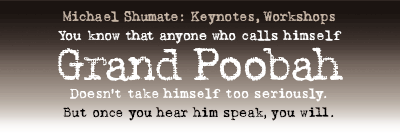
Success in the Arts
Michael’s speaking is a blend of humor and humility, the authority of logic and insight.
Michael offers keynotes of various lengths to accommodate event schedules of 60 to 90 minutes as well as longer seminars of 2 or 3 hours. Each presentation is accompanied by slides. Michael has spoken at art colleges, Artpreneur Conferences and post-secondary and high school events. One of his larger engagements was for the Frontenac County board of Education where 670 high school juniors and seniors came for a half day “Careers In The Arts Day”where he was the keynote speaker and gave two breakout sessions after. For the Art Institute of Seattle he gave a one hour “Success In The Arts” presentation to their enrolled students and an altered hour and a half presentation to prospective students and their parents.
For longer events, Michael has additional seminars on:
• The Nature of Talent
• The True Nature of Creativity and How to Magnify It.
• Avoiding the Prima Donna Syndrome
• Dealing with Criticism and Getting the Breaks
Michael also gives subject presentations on Illustration Conceptualizing.
Speaking Fees
60 to 90 minute keynote – $1000 (+ expenses)
Keynote + 2-3 hour seminars, Q&A – $1500 (+ expenses)
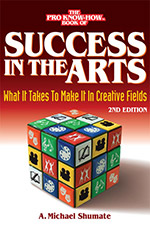
Keynote Discount on Books
When you hire Michael to speak, you can buy copies of “Success In The Arts” for your participants for a flat $5 each. Retailing at $11.95 US, that price is less than wholesale that bookstores pay. Each event participant gets a tangible take-away, and Michael will also autograph books at the event for any who wish it.
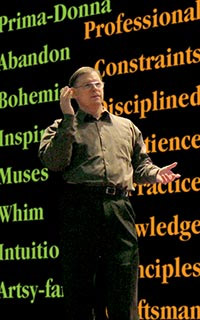
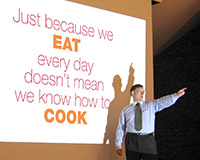


Logo Design Theory
While Michael can and will give keynote addresses about Logo Design Theory, the nature of this material is best shared in a half day or whole day workshop at graphic design schools or mid to large design studios. At these he provides masters for numerous handouts which can be printed ahead of time for participants. For schools Michael leaves a library of project sheets and slide shows for future faculty use.
There is so much material to cover:
• What does history teach about effective logos?
• What can we learn from some high profile corporate identities in their evolution over the last century?
• What principles can we glean from the work of the top identity designers of the last century?
• What are the seven deadly sins of logo design?
• How many kinds of identity concepts are there?
• How can knowing that help generate more and better identity concepts?
• What techniques can turn a common concept into an uncommon, even remarkable identity?
• Are there principles of identity design that don’t change, that transcend fad and fashion?
• What principles can assure effective identity size and spatial considerations as well as color choices?
Speaking/Workshop Fees
60 to 90 minute keynote – $1000 plus expenses
Half to whole day student seminars – $1500 + expenses.
Two day faculty training seminar (+ library) $2000 + expenses
Workshop Discount on Books
When you hire Michael to speak, you can buy copies of “Logo Design Theory” for a flat $10 each. Retailing at $28.95 US, that price is less than wholesale that bookstores pay. Not only does this give each each of your workshop participants a tangible take-away, but permanent reference source for the future.
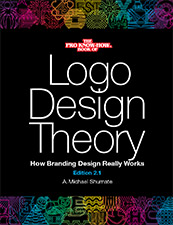
How to Reduce Costs
Frankly, I’d almost speak for free, but the travel is exhausting. A typical speaking engagement takes three days out of my schedule (one day to get there, one day for the event, one day to return). That’s why my charge for a half day workshop is so close to the fee for just a keynote presentation.
The biggest expenses are not my fee, meals or hotel, but the airfare. If you can interest a sister institution in booking me a day apart from your event, the airfare expense can be halved for each of you. Even another engagement in the same region can allow significant savings for you. If you get a third one, the airfare expenses for each will drop further. You know your local colleagues far better than me. It’s a win-win for us all.
Given the two different subject areas I teach, the other institution doesn’t have to be a direct competitor. A design studio could engage me to give a one or two day-long workshop and coordinate with an art school or a graphic design school. There are many combinations that can work. And a few phone calls on your part can result in big benefits to tight budgets.

